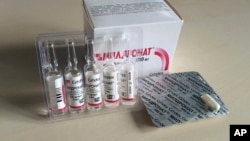A Russian athlete is suspected of breaching doping rules at the PyeongChang Winter Olympic Games.
Russian curlers said that a coach on their team told them late Sunday (South Korean time) that mixed doubles bronze medalist Alexander Krushelnitsky tested positive for meldonium, a substance banned in 2016.
Russian Curling Federation president Dmitry Svishchev would not confirm the name of the athlete.
The International Olympics Committee (IOC) said on Monday that a second sample from the athlete had been taken and results would be available in 24 hours.
If confirmed positive by the second test, the incident could keep Russia's team from being reinstated and marching under the national flag at the closing ceremony.
Svishchev said it was possible that athlete's food or drink had been tampered with, suggesting that rival Russian athletes or Russia's political enemies could be responsible.
Russian tennis star Maria Sharapova was suspended for 15 months after testing positive for meldonium at the Australian Open in 2016. For ten years she had used meldonium, a drug designed for people with heart problems.
Although the idea of a curler using performance-enhancing drugs may seem strange, the sport demands a high level of physical fitness at the Olympic level.






